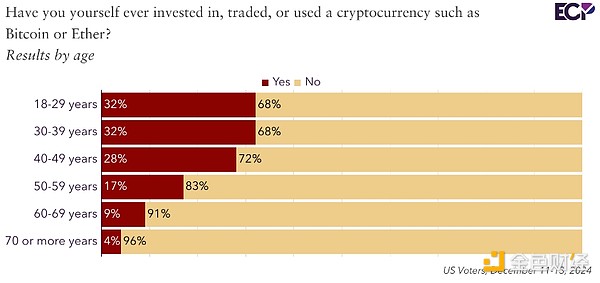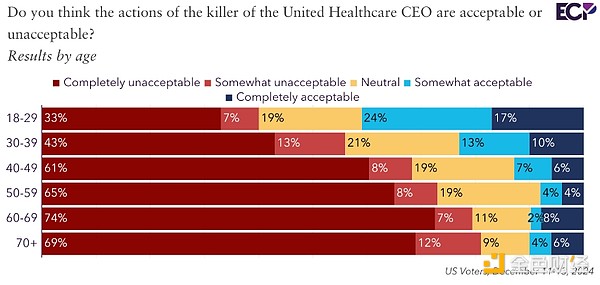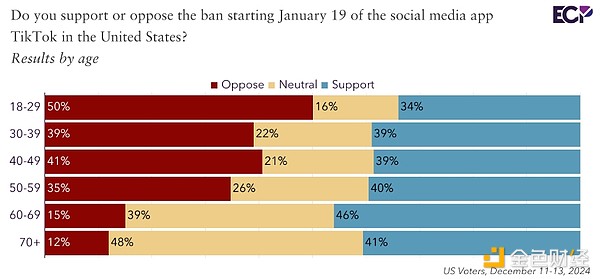Source: Emerson College; Compiled by: Baishui, Golden Finance
A new national survey from Emerson College found that about one-fifth (19%) of voters have invested in, traded, or used cryptocurrencies, while 81% have not. Among voters who have used cryptocurrencies, 61% have not used them for any purchases, while 39% have.
Crypto users are younger and represent larger minority groups, highlighting cryptocurrency as a growing and diverse constituency for political support: 57% of cryptocurrency users have a favorable view of Donald Trump,” said Spencer Kimball, executive director of Emerson College Polling. “Nearly a third of voters under 40 have used cryptocurrency, a percentage that declines with age, with 28% of voters in their 40s, 17% in their 50s, 9% in their 60s, and just 4% in their 70s being cryptocurrency users.”
Men are twice as likely as women to use cryptocurrency: 26% of men use cryptocurrency, compared to 13% of women.
Crypto users are also more likely to be from minority groups: About a third of Asian, Hispanic or black voters participate in cryptocurrency, compared with 14% of white voters.

Tariff Policy
For the United States to impose additional tariffs on Canada, Mexico and China, most voters believe that such tariffs will harm the US economy: 51% believe that additional tariffs on Canada will harm the US economy, 50% believe that additional tariffs on Mexico will harm the US economy, and 49% believe that additional tariffs on China will harm the US economy. 39% believe that tariffs on China will help the US economy, 36% believe that tariffs on Mexico will help the US economy, and 32% believe that tariffs on Canada will help the US economy.
"Voters' attitudes toward tariffs diverge sharply from their 2024 voting preferences," Kimball said. Among Trump voters, 69% believe tariffs on China will help the economy, while 17% disagree. By contrast, 79% of Harris voters believe China tariffs will hurt the economy, while 13% believe they are beneficial."
Should Biden's son be pardoned
President Joe Biden's approval rating is 36% and his disapproval rating is 54%. His approval rating reflects his November numbers, while his disapproval rating has risen 2%. Over the past month, President-elect Trump's approval rating has remained stable at 51%, while 45% have an unfavorable view of him.
Voters were asked whether they support or oppose President Biden pardoning his son Hunter. A majority (52%) oppose, 28% support, and 19% are unsure. Voters were also asked whether they would support President-elect Trump pardoning those involved in the January 6th events; 50% oppose, 34% support, and 16% are neutral.
Healthcare CEO Assassinated
A majority of voters (68%) believe the actions of the killer who killed UnitedHealthcare CEO Brian Thompson were unacceptable. 17% believe the actions were acceptable, while 16% are unsure.
"While 68% of voters overall disapprove of the killer's actions, younger voters and Democrats are more divided -- 41% of voters aged 18-29 say the killer's actions were acceptable (24% somewhat acceptable, 17% totally acceptable) versus 40% who say they were unacceptable; 22% of Democrats say it was acceptable versus 59% who say it was unacceptable, compared to 12% of Republicans and 16% of independents, highlighting a shift in social attitudes among the youngest voters and within party lines."
Men are more likely than women to say the actions were acceptable: 19% of men say the actions were acceptable versus 14% of women.

TikTok Ban
A majority of American voters (40%) support banning TikTok starting January 19, 30% oppose, and 30% are unsure.
“Half of voters under 30 oppose a TikTok ban, while 34% support it,” Kimball said.“Support for a ban generally increases with age, with support highest among voters in their 60s at 46%.”

Early 2028 Candidate Favorability Survey
Voters were asked whether they had a favorable impression of several public figures previously mentioned in Emerson’s November national poll. Mark Cuban (35% like, 10% have never heard of), Alexandria Ocasio-Cortez (29% like, 14% have never heard of) and Pete Buttigieg (34% like, 15% have never heard of) are the most popular potential candidates among voters.
Among Democratic voters, Pete Buttigieg (57%), Alexandria Ocasio-Cortez (54%), Gavin Newsom (50%), Gretchen Whitmer (46%) and Mark Cuban (44%) are the most popular potential candidates.
“It’s worth noting that while Cuban ranks fifth among Democrats, he leads among independents by 33%,” Kimball said. "Meanwhile, AOC emerged as the most polarizing figure, with strong support from Democrats but equally strong opposition from Republicans."
Vice President-elect JD Vance's approval ratings were split: 41% had a favorable view of the future vice president, while 41% had an unfavorable view of him. Future Government Effectiveness co-head Elon Musk also had a split favorability rating among voters: 43% had a favorable view of Musk, while 43% had an unfavorable view of him.
 Alex
Alex
 Alex
Alex Kikyo
Kikyo Brian
Brian Alex
Alex Alex
Alex Alex
Alex Joy
Joy Brian
Brian Snake
Snake Kikyo
Kikyo